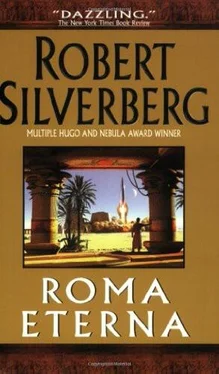Robert Silverberg - The Second Wave
Здесь есть возможность читать онлайн «Robert Silverberg - The Second Wave» весь текст электронной книги совершенно бесплатно (целиком полную версию без сокращений). В некоторых случаях можно слушать аудио, скачать через торрент в формате fb2 и присутствует краткое содержание. Год выпуска: 2003, ISBN: 2003, Издательство: HarperCollins, Жанр: Альтернативная история, на английском языке. Описание произведения, (предисловие) а так же отзывы посетителей доступны на портале библиотеки ЛибКат.
- Название:The Second Wave
- Автор:
- Издательство:HarperCollins
- Жанр:
- Год:2003
- ISBN:978-0-380-97859-5
- Рейтинг книги:4 / 5. Голосов: 1
-
Избранное:Добавить в избранное
- Отзывы:
-
Ваша оценка:
- 80
- 1
- 2
- 3
- 4
- 5
The Second Wave: краткое содержание, описание и аннотация
Предлагаем к чтению аннотацию, описание, краткое содержание или предисловие (зависит от того, что написал сам автор книги «The Second Wave»). Если вы не нашли необходимую информацию о книге — напишите в комментариях, мы постараемся отыскать её.
The Second Wave — читать онлайн бесплатно полную книгу (весь текст) целиком
Ниже представлен текст книги, разбитый по страницам. Система сохранения места последней прочитанной страницы, позволяет с удобством читать онлайн бесплатно книгу «The Second Wave», без необходимости каждый раз заново искать на чём Вы остановились. Поставьте закладку, и сможете в любой момент перейти на страницу, на которой закончили чтение.
Интервал:
Закладка:
The power of the storm seemed almost supernatural. Was Olaus the Dane in league with the gods of this land? It was as though he did not deign to expend his warriors against the invaders, but had sent this terrible tempest instead.
Nor was there any way to hide from it. All they could do was to lie cowering in the midday darkness, pinned down along this narrow strip of beach, while the whirlwinds screamed above them. Lightning cut across the sky like the flash of mighty swords. The boom of thunder mingled with the horrifying wail of the rending winds.
After some hours the rain seemed to slacken, and then it abruptly halted. An eerie stillness descended over the scene. There was something strange, almost crackling, about the quiet air. Drusus rose, stunned, and began to survey the devastation: the ruined walls, the vanished tents, the overturned wagons, the scattered weaponry. But then almost at once the wind and rain returned, sweeping back as if the storm had only been mocking them with that interlude of peace, and the renewed battering went on all night.
When morning came the camp was a shambles. Nothing that they had built still stood. The walls were gone. So was a wide swathe of beachfront trees. There were deep pools all up and down the beach and hundreds of drowned men lay asprawl in them. Many of the ships had disappeared and others were lying on their sides in the water.
The day brought choking heat, air so clogged with moisture it was next to impossible to breathe, and wave upon wave of noxious creatures—snakes, spiders, avalanches of stinging ants, platoons of scorpions, and all manner of other unpleasant things—that the storm appeared to have flushed out of the forest and driven toward the beach. It was like a dream that would not end with the coming of daybreak. Grimly Drusus marshaled his men and set them to working at cleaning the place up, but it was hard to know where to begin, and everyone moved as though still adrift in sleep.
For two days they struggled against the chaos that the storm had left. On the second morning Drusus sent a runner down toward Capito’s camp to find out how things had fared there, but the man returned in little more than an hour, reporting that a great arc of beachfront had been washed away not far to the south, cutting the shoreline route in half, and the forest flanking the coast was such a maze of fallen trees that he had found that impassable too and had to turn back.
On the third day came the first Maian offensive: a shower of arrows, descending without warning out of thin air. No archers were in view: they had to be well back in the forest, sending their shafts aloft without aiming, using bows of unusual force and carrying power. Down from the sky the arrows came in the hundreds, in the thousands, even, striking at random in the Roman camp. Fifty men perished within moments. Drusus ordered five squadrons of armored infantrymen into the forest under the command of Marcus Junianus in search of the attackers, but they found no signs of anyone.
The next day a ship flying the banner of Lucius Aemilius Capito appeared in the harbor, with three more behind it. Drusus had himself rowed out to greet the Consul. Capito, looking very much the worse for wear, told him that the storm had all but destroyed his camp: he had lost nearly half his men and all his equipment, and the site itself had been rendered unusable by flooding. These were his only surviving ships. Unable to make contact with the southern camp of Masurius Titanus, he had come sailing up the coast, hoping to find Drusus’s camp still reasonably intact.
Drusus had no alternative but to surrender command of the camp to Capito, although the older man seemed addled and befogged by all that had befallen him. “He is useless,” said Marcus Junianus vehemently, but Drusus shrugged away his friend’s objections: Capito was the senior officer, and that was that.
Another attack by archers came the next day, and the day after that. The arrows came in thicker clouds even than before, falling in dense barrages from the sky. Drusus understood now that there was no end to the Maian archers—he imagined thousands of them, millions, standing calmly in row upon row for miles, each row waiting to step forward and discharge its arrows when the one before it had had its turn. This land was full of people and all of them were enemies of Roma. And here the invading force waited in the wreckage of its camp, unable to move fifty feet into that steaming inimical jungle, vulnerable to new storms, venomous crawling creatures, hunger, illness, mosquitoes, arrows. Arrows. It was an impossible situation. Things could not have been worse for Quinctilius Varus who had lost the three legions of Augustus Caesar. But there were seven legions at risk here.
After proper consultation with the obviously ailing Capito, Drusus stationed a line of his own archers along the beach, who met the Maian onslaught with shafts of their own, sent blindly into the bush. This had some small effect: a dozen dead Maia were found after the battle. They were wearing armor of a sort, made of quilted cotton. But the Romans had lost twenty more to the arrows falling from the sky in the second attack, and fifteen in the third. The camp was still full of snakes, and they did lethal work also; and other men puffed up and died from the stings of insects, no one knew which.
Fever was the next enemy—the men began sickening by the dozens—and food was beginning to run short, the storm having denuded the nearby forest of its deer and pigs. Marcus Junianus drew Drusus aside and said, “We are beaten, even as the first expedition was. We should get aboard our ships and sail for home.” Drusus shook his head, though he knew it was true. Any order to retreat would have to come from Capito, and the Consul was lost in some foggy feverish dream.
So the days passed. Each dawn brought its casualties from disease or hunger or simple weariness, and the sporadic attacks by the Maian archers brought more. “We will smash down the walls of their city,” Capito declared in one of his few lucid moments, but Drusus knew there was no possibility of that. It was all they could do to hold their own here at the camp, forage for food and water, drive off the unending waves of archers.
On the twenty-third day a little band of men, perhaps fifty of them, gaunt and ravaged, came staggering up the beach from the south. They were the only survivors of Masurius Titianus’s camp, who had cut their way through the forest in search of other remaining Romans. Titianus himself was dead, and all their ships had gone down in the storm.
“We have to leave this place,” Drusus told the glassy-eyed Capito. “There’s no hope for us here. The archers will pick us off by handfuls every day, and if the rest of us don’t die of fever, eventually Olaus the Dane will send an army in here to finish the job.”
“The Emperor has sent us to conquer this land,” said Capito, rising halfway to a sitting position and glaring around with some desperate semblance of vitality. “Are we not Romans? Do we dare return to His Imperial Majesty with a sorry tale of failure?” And sank back exhausted, muttering in indistinct whispers; but Drusus knew that he must still regard him as the commander.
On the twenty-eighth day several hundred Maian troops appeared on the beach armed with spears, swarthy little men practically naked except for feather headdresses and the quilted-cotton armor. Drusus himself led the counterattack, though he was hard pressed to find enough men capable of withstanding the rigors of battle. The Maia conducted themselves surprisingly well against Roman swords and Roman shields, but finally were driven off, at the cost of thirty Roman lives. A few more battles like this, Drusus thought, and we are finished.
Capito died of his fever the next day.
Читать дальшеИнтервал:
Закладка:
Похожие книги на «The Second Wave»
Представляем Вашему вниманию похожие книги на «The Second Wave» списком для выбора. Мы отобрали схожую по названию и смыслу литературу в надежде предоставить читателям больше вариантов отыскать новые, интересные, ещё непрочитанные произведения.
Обсуждение, отзывы о книге «The Second Wave» и просто собственные мнения читателей. Оставьте ваши комментарии, напишите, что Вы думаете о произведении, его смысле или главных героях. Укажите что конкретно понравилось, а что нет, и почему Вы так считаете.












